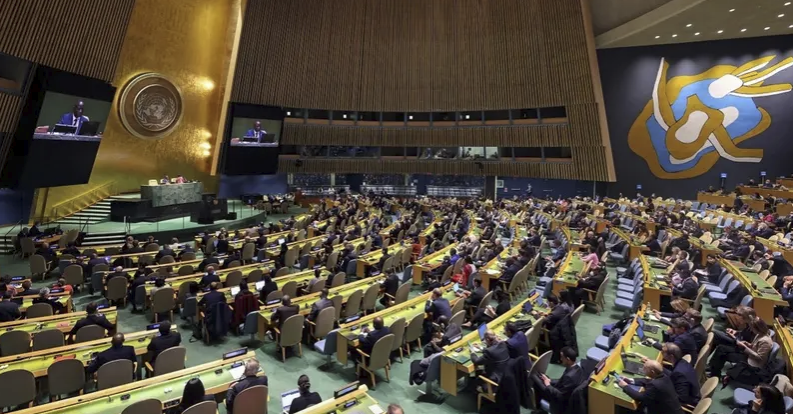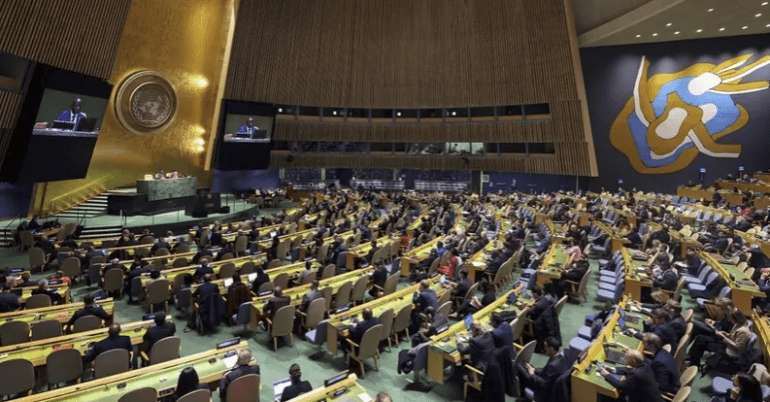By Zaina Adamu

Why African countries voted the way they did during the United Nations General Assembly’s (UNGA) resolution on Russia’s aggression against Ukraine is complex and nuanced, and exposes a troubling picture about preconceptions of Africa’s foreign policy agenda.
Of the 54 African nations that voted, 28 voted in favor, one voted against, 17 abstained and eight chose not to participate, which has left some analysts befuddled about what Africa’s voting behavior means for the future of Africa-Global North relations. That African states voted in favor of the resolution simply to appease the West is impractical at best. How Africa voted signaled a clear message: diplomatic relations with other governments – or the lack thereof – do not precede its own self-interests. A close examination of how four African countries voted illustrates this.
Ghana: Voted in Favour
Ghana, a country with strong bilateral ties to both the West and Russia, voted in favour of the resolution. There are several factors to consider. Ghana has long been known to be meticulous in how it presents itself on the world stage. As one of only two African nations elected to serve on the UN Security Council last year, its vote was meant to demonstrate its alignment with the UN Charter and reinforce its image as a “don’t rock the boat” supporter of the international rules-based order.
But Ghana’s vote plays into a more targeted strategy in that it recognizes the preponderance of the West and its influence on global bodies, including the UN, World Bank, the IMF and other international aid agencies. At present, the EU (both the European Commission and the EU member states), finances approximately half of all Official Development Assistance (ODA) received by Ghana. Since a majority of the ODA from the EU comes in the forms of grants, Ghana’s government does not have to repay the funding it receives. Moreover, the EU is Ghana’s most important trading partner. Its largest exports: cocoa, gold and oil, was valued at $4 billion in 2015.
Ghana-Europe relations relished in high-yielding economic cooperation since the 1975 Lomé Convention. Subsequent partnership agreements strengthened their bond, but Ghana is careful not to circumvent its relations with Russia. Diplomatic ties between the two countries have been relatively strong since Ghana’s independence in 1957 and have continued with the signed Ghana-Russia agreements on trade, economic and cultural cooperation.
Another factor to note: The Africa Centre for International Law and Accountability’s executive director, William Nyarko, surfaced a buried link from Ghana’s Russian Embassy website, which published a two-sentence statement acknowledging that Ghana’s finance minister, Ken Ofori-Atta, met with Russia’s ambassador to Ghana, Sergei Berdnikov, to talk “trade and economic cooperation” just weeks after Ghana voted against Russia. Two weeks after their meeting, Ghana abstained from voting on the April UN resolution calling for Russia to be suspended from the Human Rights Council.
“It is possible that Ghana reached out to Russia behind closed doors and said ‘listen, we’re voting against you but it’s because we had to. We still want to partner with you.’ Many nations do this to maintain diplomatic relations,” said Nyarko.
Eritrea: Voted against
On the surface, Eritrea said it voted against the resolution because it regretted that the “humanitarian issue [had become] politicized.” But beneath the surface, Eritrea’s support of Russia stems from its alignment with anti-Western policies, which has been a significant pillar of Eritrea’s longstanding dictatorship. Considered a pariah state by many developed nations, the Eritrean regime has long supported Russian policy and recently held diplomatic talks during a visit to Moscow where they discussed an agenda for Russia-Eritrea cooperation.
Eritrean President Isaias Afwerki paralleled the West’s involvement in the Ukraine crisis to that of the Cold War, stating it “embarked on a policy of ‘containment’ of Russia, which was then perceived as their primary rival within a broad strategic framework.” The dictator, regarded as one of the world’s most despotic leaders, places strict restrictions on foreign aid, claiming it is corrupt and suppresses its recipients — an ironic viewpoint considering its government is one of the most repressive and tyrannical in modern-day history.
Eritrea voting in favor of Russia is symbolic in that it flexes its agenda against the status quo and demonstrates its commiseration with Russia. In spite of this, Russia’s foreign minister, Sergey Lavrov, did not select Eritrea as a country to visit during his recent four-nation African tour.
South Africa: Abstained
South Africa’s concern about the UN’s inability to create friendly dialogue amid the Russia-Ukraine conflict led the country to abstain from voting on the resolution. South Africa’s abstention substantiates its allegiance to the Non-Aligned Movement, the second largest forum of states that neither aligns with or against any major power bloc. Moreover, the nation’s association with BRICS, the world’s five-leading emerging economies (comprising Brazil, Russia, India, China and South Africa) hints that their vote was an attempt to maintain trade relations with its allies, Russia and China.
Critics argue South Africa’s nonpartisan approach stains its relationship with the West, specifically because South Africa is the EU’s largest trading partner. Furthermore, the nation’s lax reaction to Russia’s violation of international law may hurt when it needs international support down the line.
Ethiopia: Didn’t vote
A longtime supporter of Russia, Ethiopia’s relationship with the Eurasian country stretches back to Russia volunteering its soldiers during the First Italo-Ethiopian War, a battle in which Ethiopian forces defeated Italy in 1896. More recently, Russia used its veto to block the UN Security Council from making statements condemning violence in Ethiopia’s besieged Tigray region. So Ethiopia not voting on the resolution is an obvious quid pro quo.
This is partly why it came as no surprise that the Russian foreign minister chose Ethiopia as his last stop to visit during his tour of Africa in July. Both countries, facing pressure from the West over their current military operations, are historic allies. Ethiopia backed Russia during the Cold War, and despite Russia’s relatively small economic presence in Ethiopia, the two countries entered into a security partnership last year.
Foreign policy analysts will be waiting with bated breath for the Russia-Africa Summit, which has been rescheduled for July 2023. Which heads of state attend (or don’t) will undoubtedly express their stance on Russia. The West must change the idea that Africa should adopt an “us or them” mentality when they vote on UN resolutions. African states should not have to pick a side, and if they choose to, it is best to recognize that their choice is to serve their own interests and not the interests of external foreign bodies.
About the Author
Zaina Adamu is the co-editor-in-chief of Thrēo. She currently serves as president of the Harvard Alumni for Global Development and is the Global Partnerships chair at Harvard W3D: Women in Defense, Diplomacy and Development.

